Hero of Heroes?
Gordon : Martyr and Misfit. By Anthony Nutting. (Constable, 35s.) `ALt_ that the flesh admires is doomed. . . . Cursed is the man who makes the flesh his arm. . . . As crucifixion was a slow process, so is our slow death for the flesh. It makes us yearn for complete deliverance.' The voice is that of Charles George Gordon, and its theme the ruling passion of his life. Gordon found his deliverance at the hands of an Ansar warrior, at Khartoum in 1885; at his death, an empire mourned the man whom Gladstone calved 'a hero of heroes'; and Gladstone's party lost office because of it. The hero, the martyr, the soldier-saint (as people then saw him) achieved a lifetime's ambition- death—by compromising his Government and disobeying its orders. In dying, he needlessly took many others with him. After the plaudits and the tears came, inevitably, the denigration. Eventually Lytton Strachey, opening a seam which has proved profitable to this day, did a
thorough debunking job in Eminent Victorians (1918). Strachey's essay, which another bio- grapher has called 'an ingenious travesty,' sought to prove Gordon a fraud, a purposeless man, and a drunkard.
Mr Anthony Nutting deals well and reason- ably with Strachey's charges, and others besides. His long, intensely interesting book pros ides copious evidence of Gordon's real faults—his petulance, his unity, his suspicion of other people's motil. es, his vacillations in aim and feel- ing, his almost total inability to distinguish friend from foe. One remarkable thing about Gordon is that. despite the often bewildering in- consistency of his conduct, the massive wrong- headedness of many of his views and decisions, despite his phenomenal selfishness, his frequent harshness and the fact that he let down or destroyed many who had depended on him, neither Mr Nutting nor the reader ever grow s tired of him. In today's jargon, Gordon is 'human and vital.; one goes with him every step of the mazy agonising way.
Mr Nutting has done two things in this im- portant biography. besides telling, very clearly and well, the star y of the British commitment in Egypt, and the political and military events leading to the tragedy of Khartoum. He has given a full account of 'Chinese Gordon's' career in China, where he helped to crush the Taiping rebellion, and became a field-marshal of the Chinese army and a mandarin of the 'Yellow Jacket.' In this he shows how the switherin es and doubts, the touchiness, the dog-in-the- manger attitude to others, the lack of discipline of this 'eccentric irregular soldier,' were already set in the pattern which was to be repeated, so disastrously, in the Sudan. He has also kept con- tinually before the reader Gordon's extremely strong religious feeling—no mere religiosity, but a constantly comforting vision—and its corollary, the equally strong, often ecstatic longing for death. 'The dead do not marry!' he told a friend; and Charles Gordon never married.
There is a fine crop of psychoanalytical hay to be made from Gordon's story but, wisely, Mr Nutting does not try to make it. There is no one alive now to tell us more than we already know. It is possible that Charles George Gordon was very close to the Zeitgeist, that he repre- sented accurately his own people at that time. His mixture of courage and confusion, method and muddle, technical skill and psychological naivety, individualism and self-pity, blind vanity and desperate humility, his longing for God and his distrust of earthly glory even while seeking it —these are, surely, the ambivalences which make the Victorian age so richly intriguing to its dis- tracted heirs. In any event, it could be said that Gordon's death was not wasted. He paved the way (since his Government was, largely through him, committed to making sense of the Sudan) to the pacification which followed Omdurman, fourteen years after his death, and to the estab- lishment of a colonial administration of which his people (whatever their present doubts about their past actions) need never cease to be proud.
WILLIAM BUCHAN







































 Previous page
Previous page